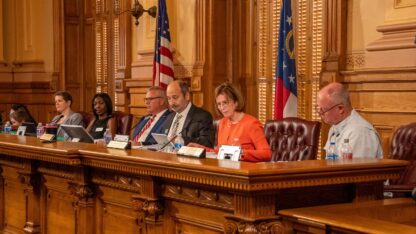Presidential candidates Cornel West and Claudia De la Cruz aren’t qualified to be on Georgia’s ballots and votes for them should not count, the Georgia Supreme Court ruled Wednesday.
Following a hearing Tuesday, the unanimous court agreed that West and De la Cruz failed to qualify. That’s because their presidential electors did not each submit a separate petition with the 7,500 signatures needed to access Georgia’s ballots. Instead, only one petition per candidate was submitted, as specified by Georgia’s secretary of state.
Democrats who are trying to prevent other candidates from siphoning votes from Vice President Kamala Harris challenged West and De la Cruz’s positions on the ballot. West and De la Cruz qualified as independents in Georgia, although De la Cruz is the nominee of the Party for Socialism and Liberation.
Neither the West nor the De la Cruz campaigns immediately responded to emails seeking comment.
The names of both candidates will remain on Georgia’s ballots, but votes for them won’t be counted, said Robert Sinners, a spokesperson for Secretary of State Brad Raffensperger. A lawyer for Raffensperger told justices Tuesday that it’s too late to reprint ballots, in part because not enough watermarked security paper is available. There could also be problems with reprogramming voting machines.
If ordered to disqualify the candidates, Raffensperger will order notices in polling places and mailed-out ballots warning that votes for West and De la Cruz won’t count, Sinners said. That’s a common remedy for late ballot changes in Georgia.
The disqualifications will leave Georgia voters with the choice of four presidential candidates — Harris for the Democrats, Republican Donald Trump, Libertarian Chase Oliver and the Green Party’s Jill Stein.
Democrats, Republicans and Libertarians automatically qualify for elections in Georgia. Even four candidates will be the most since 2000 in Georgia.
Justice Sarah Warren, writing for a unanimous court, affirmed the rulings of two lower court judges who separately overturned Raffensperger’s decisions to qualify West and De la Cruz.
“But the defect that prevents independent presidential candidates West and De la Cruz from appearing on Georgia’s ballot does not pertain to the number of signatures acquired; it is that West’s electors and De la Cruz’s electors filed no nomination petitions at all,” Warren wrote
Justices rejected the argument that a 2017 federal court decision that lowered the signature threshold for statewide ballot access to 7,500 — citing constitutional issues — should also prohibit the claim that each of the 16 electors should have to file petitions, which would require a total of 120,000 valid signatures.
“No constitutional challenge to the current statutory scheme for qualifying candidates for the office of elector of independent candidates for president is properly before this court in these cases,” Warren wrote. “We therefore express no view on any such constitutional questions today.”
Because the court ruled no elector submitted a valid petition, an appeal into federal court on constitutional grounds could be difficult, said Bryan Tyson, a lawyer who represented West.
Georgia is one of several states where Democrats have challenged third-party and independent candidates, seeking to block nominees who could take votes from Harris after President Joe Biden won Georgia by fewer than 12,000 votes in 2020.
Republicans in Georgia have sought to keep all the candidates on the ballot, and the party has pushed to prop up liberal third-party candidates in battleground states.
Those interests have contributed to a flurry of legal activity in Georgia. An administrative law judge disqualified West, De la Cruz, Robert F. Kennedy Jr. and the Georgia Green Party from the ballot. Raffensperger, a Republican, overruled the judge, and said West and De la Cruz should get access. He also ruled that under a new Georgia law Stein should go on Georgia ballots because the national Green Party qualified her in at least 20 other states.
Kennedy’s name stayed off ballots because he withdrew his candidacy in Georgia after suspending his campaign and endorsing Trump.









